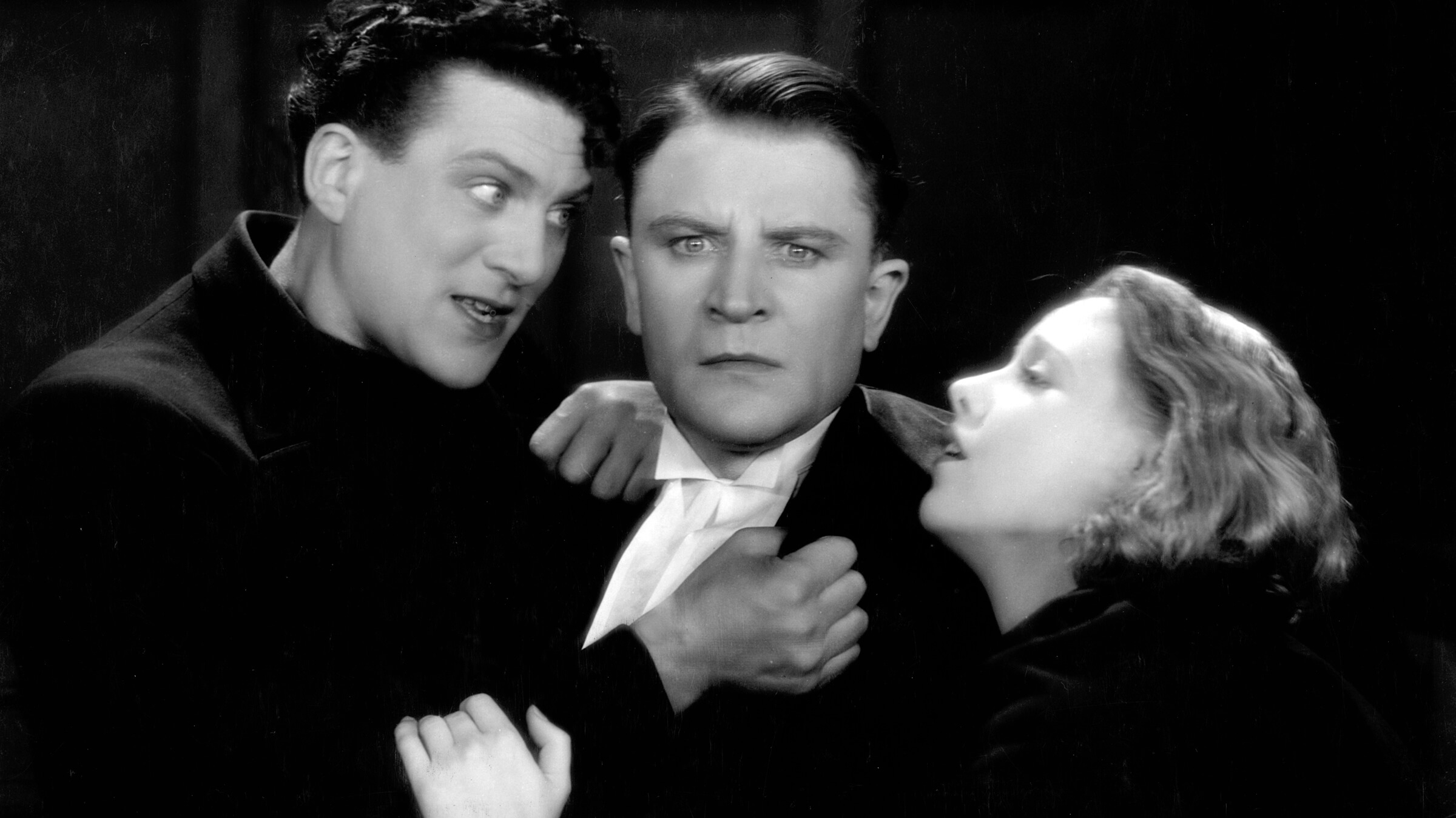
Alfred Hitchcock’s The Manxman
This event is sold out. There may be rush tickets at the event on a first-come, first-serve basis but they won’t go on sale until showtime after the house is assessed.
The Manxman will be accompanied by the Oakland Symphony conducted by maestro Ben Palmer performing an original score by Stephen Horne
Set in a remote Isle of Man fishing community (but shot in Cornwall), The Manxman is Alfred Hitchcock’s penultimate silent film and one of the best and most mature works of his early career. The film was adapted from the bestselling novel by Sir Hall Caine, published in 1894, which had sold half a million copies. Hall Caine was a well connected author, part of the late 19th century literary scene, and a onetime secretary to Dante Gabriel Rossetti. He came to specialize in stories set on the Isle of Man, where he later lived.
The story follows two boyhood friends who take markedly different paths in adulthood: Pete becomes a fisherman, Philip a lawyer. Both fall in love with the same woman, the daughter of a puritanical Methodist, bringing them into conflict not only with their own moral code but also that of the strict Manx society. This tragic love triangle might not seem like obvious territory for the director, although The Ring (1927) had proved his ability with this kind of drama. Like that earlier film, The Manxman is bursting with bold, Hitchcockian bravado. The portrayal of the wild ‘Manx’ coastline is among the most evocative in any of his work and trapped within it is the wonderful Anny Ondra. It’s a complex, sensual performance—part vulnerable waif, part flirtatious femme fatale—and clearly the reason why Hitch cast her in his suspense masterpiece, Blackmail, later that year.
The Manxman was well received by the trade press and described in The Bioscope as a film of “remarkable power and gripping interest”, but in common with most films that year it suffered from a lack of exposure due to the conversion to sound film that was underway. In interviews with Peter Bogdanovich and François Truffaut, Hitchcock later claimed The Manxman was just an “assignment” and “an old fashioned story… full of coincidences.” In fact nothing could be further from the truth. It is evident that Hitchcock took pains over the film to invest it with considerable emotional power.
Hitchcock established strong visual motifs, beginning with the ‘triskele’ (the three-legged emblem of the Isle of Man) and continued with turning millstones, whose unstoppable momentum symbolized ‘the mills of God’ as they grind slowly, a powerful metaphor for the unforgiving puritanical society confronted by the characters. Chabrol and Rohmer were enthusiastic about the story, observing that it doesn’t rely on coincidence, improbably evil figures or the vagaries of fate but instead stresses the moral dilemmas of each of the three principal characters faced with conflicting loyalties.
The adaptation skillfully extracts the key strands from the very long novel, omitting the back story which explains the bond between the childhood friends Phil and Pete, as well as Phil’s reasons for giving up the woman he loves. The strictures of Manx society so evident in the book are necessarily underplayed in the film that updates the story from the 1890s to the 1920s. The consequences for each of the characters in defying those strictures may well have been better understood by its contemporary audience, who knew that attempted suicide was punishable by a prison sentence and a woman who left her husband was treated as an outcast. —BFI National Archive
Live music by Oakland Symphony conducted by Ben Palmer performing an original score by Stephen Horne

Ben Palmer (photo above left by Artur Kondrats) is Artistic Director of Covent Garden Sinfonia and Chief Conductor of the Orchestra da Camera di Pordenone and Babylon Orchester Berlin. From 2017-24 he was Chief Conductor of the Deutsche Philharmonie Merck, ending his tenure with three performances of Mahler’s Symphony No. 8.
He is a regular visitor to the Aalborg Symphony Orchestra, Arctic Philharmonic, City of Birmingham Symphony Orchestra, the Hallé, London Symphony Orchestra, Montreal Symphony Orchestra, Royal Liverpool Philharmonic Orchestra, Royal Northern Sinfonia, Royal Scottish National Orchestra, and to the BBC Concert Orchestra, BBC National Orchestra of Wales, BBC Philharmonic, BBC Scottish Symphony Orchestra (including at the BBC Proms), and BBC Symphony Orchestra.
Personally authorised by John Williams to conduct his film scores in concert, and acclaimed as “a masterclass in conducting” by Hans Zimmer, Ben Palmer is one of the world’s most sought-after specialists in conducting live to picture. With a repertoire of more than 50 films, ranging from fiendishly difficult silent movies such as Metropolis and Modern Times, to Star Wars and Top Gun: Maverick, he appears regularly at venues such as the Royal Albert Hall, KKL Luzern and Concertgebouw Amsterdam. He is regularly invited to conduct recording sessions for leading film and television productions, with clients including Hans Zimmer’s Bleeding Fingers Music, 20th Century Fox, Studiocanal, and the LSO.
Stephen Horne (photo above right by Pamela Gentile) has long been internationally considered one of the leading silent film accompanists. A house pianist at London’s BFI Southbank for over thirty years, he has played at all the major UK venues and recorded music for many DVD and online releases of silent films. Although principally a pianist, he often incorporates other instruments into his performances, sometimes simultaneously.
He regularly performs internationally and in recent years his accompaniments have met with acclaim at film festivals in Pordenone, Bologna, San Francisco, Telluride, Paris, Cannes, Hong Kong, Bangkok, Shanghai, Seoul, Istanbul, Berlin and Vienna.
With the help of conductor-orchestrator Ben Palmer, Horne completed the fully orchestrated score for The Manxman which had its premiere at the 2022 closing gala of Le Giornate del Cinema Muto, Pordenone.
Details
Year
1929
Director
Alfred Hitchcock
Cast
Carl Brisson, Malcolm Keen, Anny Ondra, Randle Ayrton, Clare Greet
Runtime
100 min.
Special Support
Sunrise Foundation for Education and the Arts
Format
DCP
Sat, Jan 11, 2025
7:00 PM
Grace Cathedral
$35 general
$25 member
SOLD OUT
